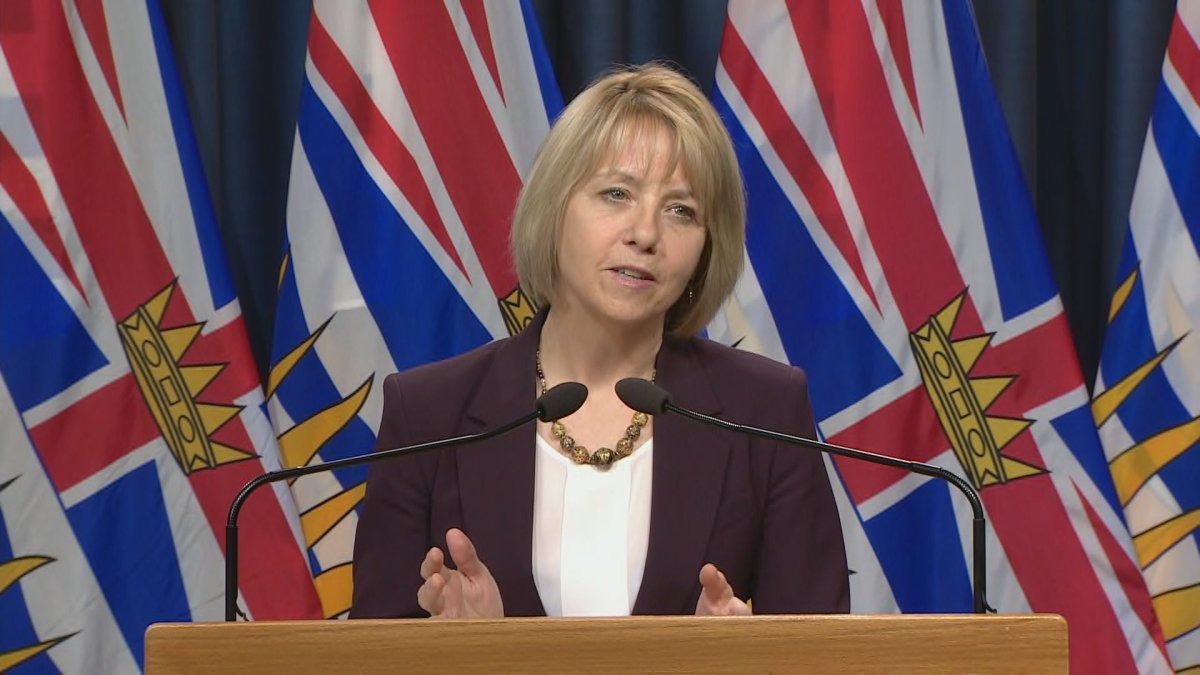Two more people have died of COVID-19 in B.C., as the province reported 26 new cases of the virus on Saturday.

Provincial health officer Dr. Bonnie Henry said the province’s death toll from the disease has reached 114, while the province confirmed 2,171 cases.
About 63 per cent of those cases have fully recovered.

Henry said that an outbreak at Chilliwack’s Fraser Valley Specialty Poultry has grown to include three workers. Fraser Health ordered the facility shuttered on Friday.
She said the province also continues to deal with challenges associated with an outbreak at Northern Alberta’s Kearl Lake oilsands project.
People returning to B.C. from the facility have been ordered to isolate for 14 days, but Henry said the province has confirmed transmission of the virus among family members of returning workers.
At least 15 cases in B.C. and 12 in Alberta have been linked to the project.
“The risks in B.C. are very high,” said Henry.
On Friday, B.C. reported encouraging hospitalization numbers, including the lowest number of people in intensive care in more than five weeks.
Henry said on Saturday that 72 people were in hospital with the virus, down from 79 on Friday, and 23 in intensive care, down one from Friday.
There are also 24 active outbreaks in long-term care and assisted living facilities, including three outbreaks that are ongoing in acute-care units.
Overall, there are 416 cases associated with long-term, assisted or acute care facilities – 261 residents and 155 staff who have been affected.
Long weekend travel
With the Easter long weekend now three weeks in the past, Henry said concerns about a possible spike in new cases have not been realized.
- Buzz kill? Gen Z less interested in coffee than older Canadians, survey shows
- ‘She gets to be 10’: Ontario child’s heart donated to girl the same age
- Bird flu risk to humans an ‘enormous concern,’ WHO says. Here’s what to know
- Canada updating sperm donor screening criteria for men who have sex with men
“We have not seen a spike related to the relatively low level of travel that happened over the Easter weekend, and we certainly have not seen introduction into some of the communities that were very concerned.”
Vancouver Island mayors have been calling for restrictions on ferry travel over fears people travelling to vacation properties could spread the disease in communities with limited medical resources.
With the May long weekend now coming up, Henry again urged people to avoid non-essential travel, but at the same time cautioned people about rushing to judge the people who are on the roads and ferries.
“We need to realize that we don’t always know people’s circumstances, and there are often very good reasons why people need to travel,” she said.
The Sweden comparison
Henry was asked Saturday about comparisons between B.C.’s pandemic restrictions and the policies in Sweden, which has resisted official orders requiring sectors of the economy to close.
Henry said in some ways, B.C.’s model was actually similar to Sweden.
Compared to other Canadian provinces, B.C. has issued relatively few closure orders — bars and restaurants, salons and tattoo shops and gatherings over 50 being the exceptions.
Sweden, however, has kept those businesses open and has been held up by some as a model of how to get to “herd immunity” by leaving the economy open and focusing on protecting seniors and other vulnerable groups.
“I will say the case fatality rates and the population fatality rates are very, very high,” said Henry.
“They also have no evidence that we can see yet that they’ve reached a level of community immunity that would be protective of further outbreaks.”
The Nordic country, which has about double B.C.’s population, has recorded 2,669 deaths from COVID 19, more than 20 times the fatalities in B.C.
“People in B.C. have been doing their part, and that’s protected us,” said Henry. “It’s protected our health-care system, and it’s protected us in terms of people who are being affected who are more vulnerable to more serious illness or death.”





Comments